QHO531 Solent University - Reflective Case Study: Project Management
VerifiedAdded on 2023/06/15
|12
|3745
|145
Case Study
AI Summary
This reflective case study examines the application of project management principles in the context of the London Olympics 2012. It explores the role of projects in delivering organizational strategy, focusing on project initiation, planning, and the project lifecycle. The study critically reviews the project context, stakeholder management, and risk management, utilizing project management tools and techniques. It analyzes the external and internal environments through SWOT and PESTEL analyses, highlighting the strengths, weaknesses, opportunities, and threats, as well as political, economic, social, technological, environmental, and legal factors affecting the project. The study also assesses stakeholder engagement and the effectiveness of risk management strategies employed during the Olympics. The conclusion provides recommendations and evaluates the overall success of the project in achieving its objectives and leaving a sustainable legacy.

Reflective
Case study
1
Case study
1
Paraphrase This Document
Need a fresh take? Get an instant paraphrase of this document with our AI Paraphraser

Contents
INTRODUCTION...........................................................................................................................3
MAIN BODY...................................................................................................................................3
TASK 1............................................................................................................................................3
The role of project in delivering organizational strategy.......................................................3
Project initiation, planning and organization..........................................................................4
TASK 2............................................................................................................................................5
Project Context.......................................................................................................................5
Stakeholder management........................................................................................................7
Risk management...................................................................................................................8
TASK 3............................................................................................................................................9
Recommendations and effectiveness of the project...............................................................9
REFRENCES.................................................................................................................................11
2
INTRODUCTION...........................................................................................................................3
MAIN BODY...................................................................................................................................3
TASK 1............................................................................................................................................3
The role of project in delivering organizational strategy.......................................................3
Project initiation, planning and organization..........................................................................4
TASK 2............................................................................................................................................5
Project Context.......................................................................................................................5
Stakeholder management........................................................................................................7
Risk management...................................................................................................................8
TASK 3............................................................................................................................................9
Recommendations and effectiveness of the project...............................................................9
REFRENCES.................................................................................................................................11
2
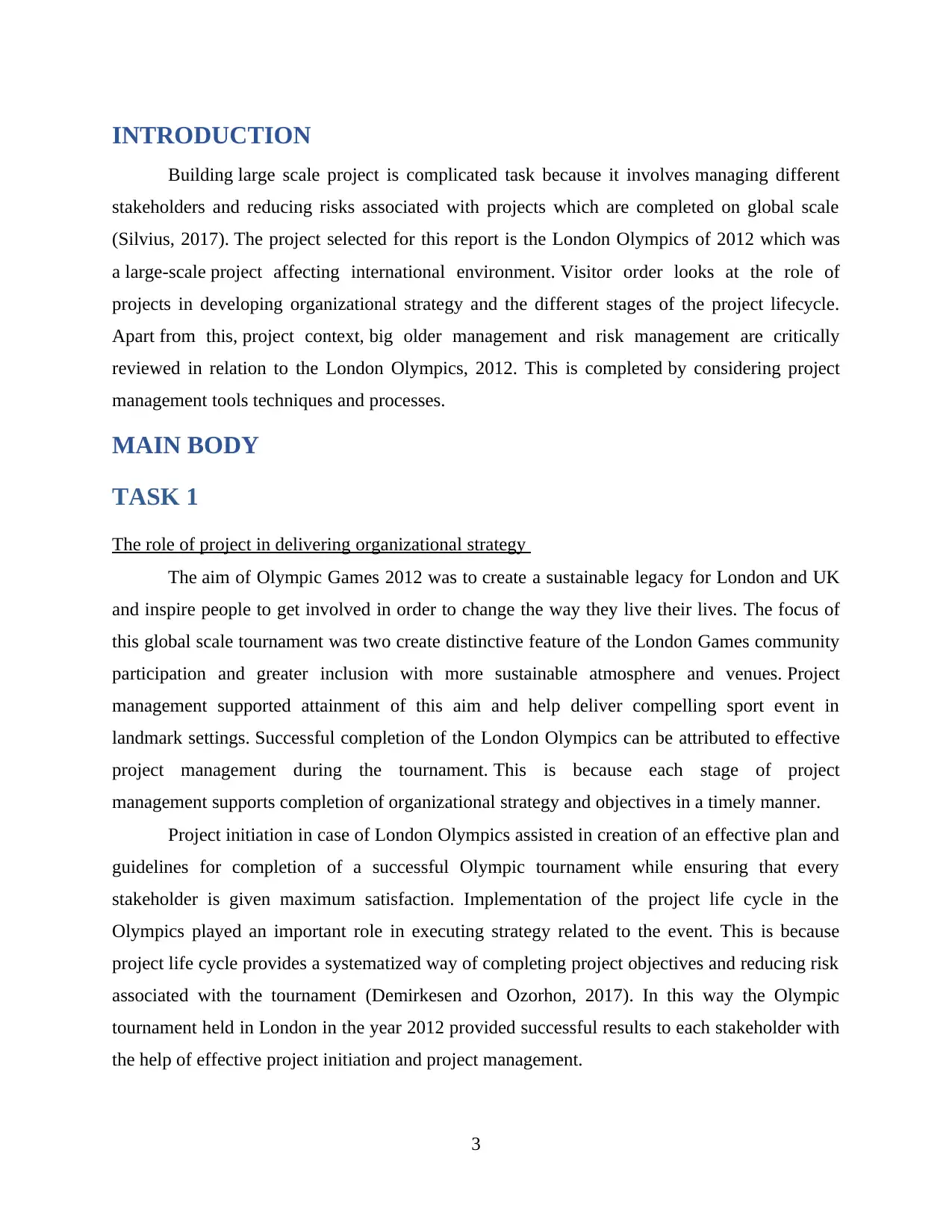
INTRODUCTION
Building large scale project is complicated task because it involves managing different
stakeholders and reducing risks associated with projects which are completed on global scale
(Silvius, 2017). The project selected for this report is the London Olympics of 2012 which was
a large-scale project affecting international environment. Visitor order looks at the role of
projects in developing organizational strategy and the different stages of the project lifecycle.
Apart from this, project context, big older management and risk management are critically
reviewed in relation to the London Olympics, 2012. This is completed by considering project
management tools techniques and processes.
MAIN BODY
TASK 1
The role of project in delivering organizational strategy
The aim of Olympic Games 2012 was to create a sustainable legacy for London and UK
and inspire people to get involved in order to change the way they live their lives. The focus of
this global scale tournament was two create distinctive feature of the London Games community
participation and greater inclusion with more sustainable atmosphere and venues. Project
management supported attainment of this aim and help deliver compelling sport event in
landmark settings. Successful completion of the London Olympics can be attributed to effective
project management during the tournament. This is because each stage of project
management supports completion of organizational strategy and objectives in a timely manner.
Project initiation in case of London Olympics assisted in creation of an effective plan and
guidelines for completion of a successful Olympic tournament while ensuring that every
stakeholder is given maximum satisfaction. Implementation of the project life cycle in the
Olympics played an important role in executing strategy related to the event. This is because
project life cycle provides a systematized way of completing project objectives and reducing risk
associated with the tournament (Demirkesen and Ozorhon, 2017). In this way the Olympic
tournament held in London in the year 2012 provided successful results to each stakeholder with
the help of effective project initiation and project management.
3
Building large scale project is complicated task because it involves managing different
stakeholders and reducing risks associated with projects which are completed on global scale
(Silvius, 2017). The project selected for this report is the London Olympics of 2012 which was
a large-scale project affecting international environment. Visitor order looks at the role of
projects in developing organizational strategy and the different stages of the project lifecycle.
Apart from this, project context, big older management and risk management are critically
reviewed in relation to the London Olympics, 2012. This is completed by considering project
management tools techniques and processes.
MAIN BODY
TASK 1
The role of project in delivering organizational strategy
The aim of Olympic Games 2012 was to create a sustainable legacy for London and UK
and inspire people to get involved in order to change the way they live their lives. The focus of
this global scale tournament was two create distinctive feature of the London Games community
participation and greater inclusion with more sustainable atmosphere and venues. Project
management supported attainment of this aim and help deliver compelling sport event in
landmark settings. Successful completion of the London Olympics can be attributed to effective
project management during the tournament. This is because each stage of project
management supports completion of organizational strategy and objectives in a timely manner.
Project initiation in case of London Olympics assisted in creation of an effective plan and
guidelines for completion of a successful Olympic tournament while ensuring that every
stakeholder is given maximum satisfaction. Implementation of the project life cycle in the
Olympics played an important role in executing strategy related to the event. This is because
project life cycle provides a systematized way of completing project objectives and reducing risk
associated with the tournament (Demirkesen and Ozorhon, 2017). In this way the Olympic
tournament held in London in the year 2012 provided successful results to each stakeholder with
the help of effective project initiation and project management.
3
⊘ This is a preview!⊘
Do you want full access?
Subscribe today to unlock all pages.

Trusted by 1+ million students worldwide
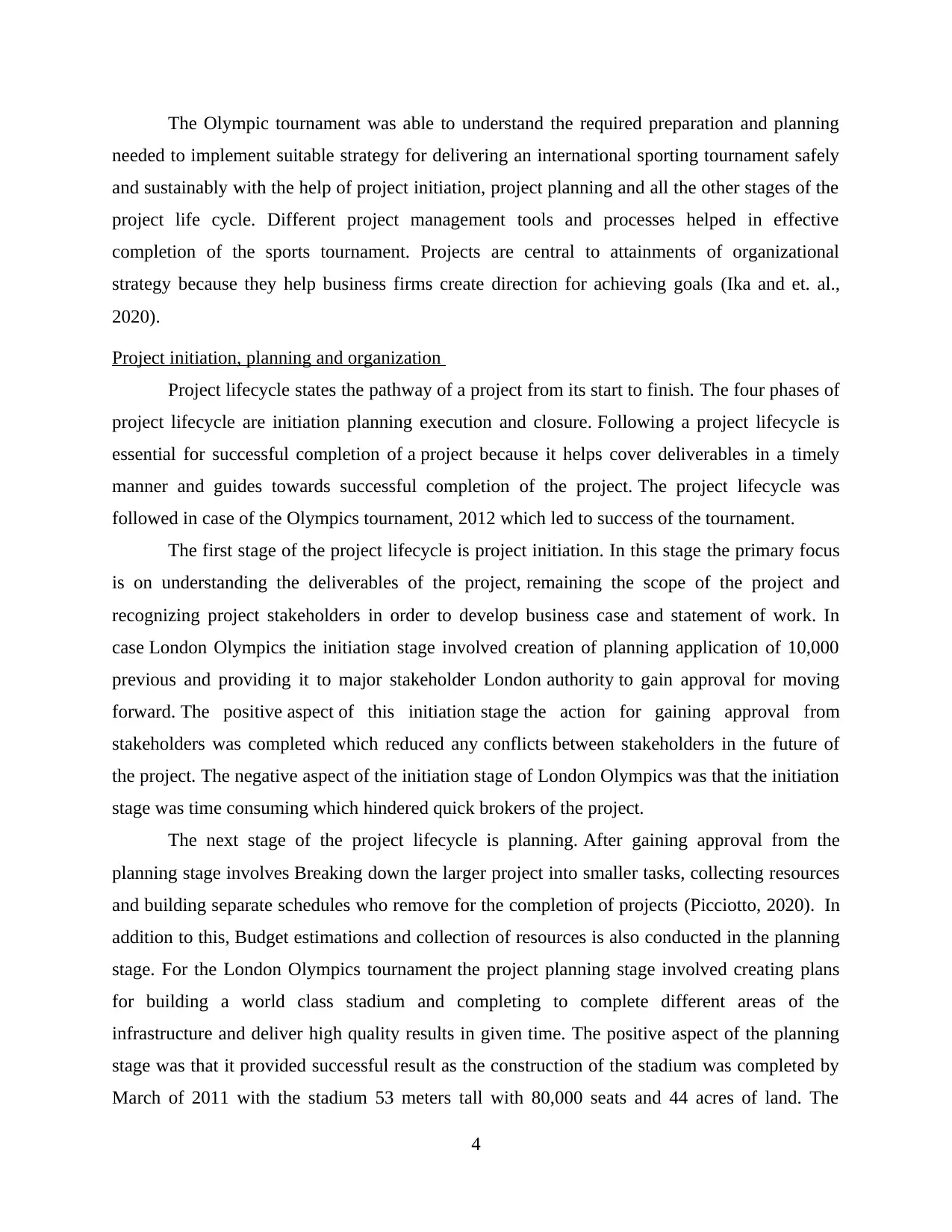
The Olympic tournament was able to understand the required preparation and planning
needed to implement suitable strategy for delivering an international sporting tournament safely
and sustainably with the help of project initiation, project planning and all the other stages of the
project life cycle. Different project management tools and processes helped in effective
completion of the sports tournament. Projects are central to attainments of organizational
strategy because they help business firms create direction for achieving goals (Ika and et. al.,
2020).
Project initiation, planning and organization
Project lifecycle states the pathway of a project from its start to finish. The four phases of
project lifecycle are initiation planning execution and closure. Following a project lifecycle is
essential for successful completion of a project because it helps cover deliverables in a timely
manner and guides towards successful completion of the project. The project lifecycle was
followed in case of the Olympics tournament, 2012 which led to success of the tournament.
The first stage of the project lifecycle is project initiation. In this stage the primary focus
is on understanding the deliverables of the project, remaining the scope of the project and
recognizing project stakeholders in order to develop business case and statement of work. In
case London Olympics the initiation stage involved creation of planning application of 10,000
previous and providing it to major stakeholder London authority to gain approval for moving
forward. The positive aspect of this initiation stage the action for gaining approval from
stakeholders was completed which reduced any conflicts between stakeholders in the future of
the project. The negative aspect of the initiation stage of London Olympics was that the initiation
stage was time consuming which hindered quick brokers of the project.
The next stage of the project lifecycle is planning. After gaining approval from the
planning stage involves Breaking down the larger project into smaller tasks, collecting resources
and building separate schedules who remove for the completion of projects (Picciotto, 2020). In
addition to this, Budget estimations and collection of resources is also conducted in the planning
stage. For the London Olympics tournament the project planning stage involved creating plans
for building a world class stadium and completing to complete different areas of the
infrastructure and deliver high quality results in given time. The positive aspect of the planning
stage was that it provided successful result as the construction of the stadium was completed by
March of 2011 with the stadium 53 meters tall with 80,000 seats and 44 acres of land. The
4
needed to implement suitable strategy for delivering an international sporting tournament safely
and sustainably with the help of project initiation, project planning and all the other stages of the
project life cycle. Different project management tools and processes helped in effective
completion of the sports tournament. Projects are central to attainments of organizational
strategy because they help business firms create direction for achieving goals (Ika and et. al.,
2020).
Project initiation, planning and organization
Project lifecycle states the pathway of a project from its start to finish. The four phases of
project lifecycle are initiation planning execution and closure. Following a project lifecycle is
essential for successful completion of a project because it helps cover deliverables in a timely
manner and guides towards successful completion of the project. The project lifecycle was
followed in case of the Olympics tournament, 2012 which led to success of the tournament.
The first stage of the project lifecycle is project initiation. In this stage the primary focus
is on understanding the deliverables of the project, remaining the scope of the project and
recognizing project stakeholders in order to develop business case and statement of work. In
case London Olympics the initiation stage involved creation of planning application of 10,000
previous and providing it to major stakeholder London authority to gain approval for moving
forward. The positive aspect of this initiation stage the action for gaining approval from
stakeholders was completed which reduced any conflicts between stakeholders in the future of
the project. The negative aspect of the initiation stage of London Olympics was that the initiation
stage was time consuming which hindered quick brokers of the project.
The next stage of the project lifecycle is planning. After gaining approval from the
planning stage involves Breaking down the larger project into smaller tasks, collecting resources
and building separate schedules who remove for the completion of projects (Picciotto, 2020). In
addition to this, Budget estimations and collection of resources is also conducted in the planning
stage. For the London Olympics tournament the project planning stage involved creating plans
for building a world class stadium and completing to complete different areas of the
infrastructure and deliver high quality results in given time. The positive aspect of the planning
stage was that it provided successful result as the construction of the stadium was completed by
March of 2011 with the stadium 53 meters tall with 80,000 seats and 44 acres of land. The
4
Paraphrase This Document
Need a fresh take? Get an instant paraphrase of this document with our AI Paraphraser
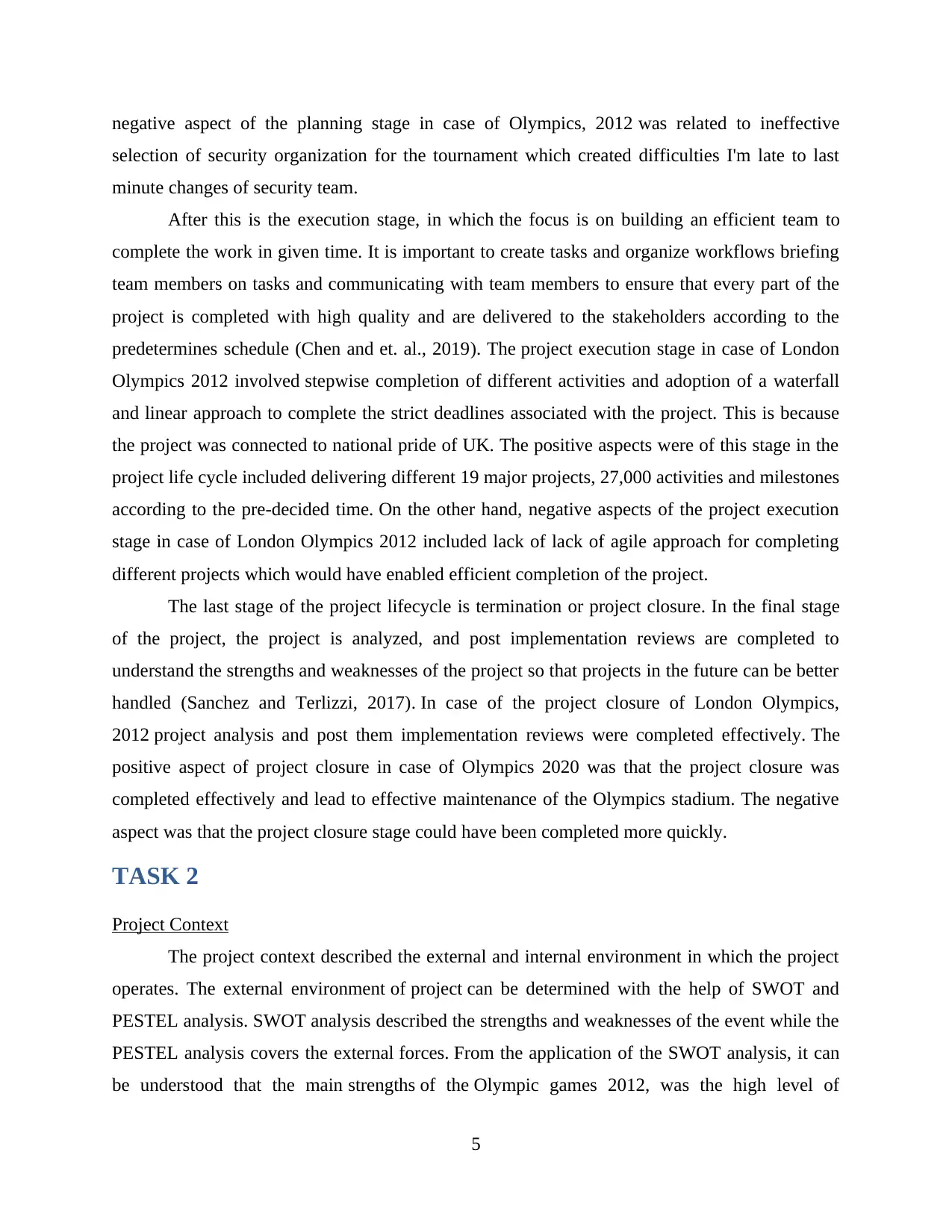
negative aspect of the planning stage in case of Olympics, 2012 was related to ineffective
selection of security organization for the tournament which created difficulties I'm late to last
minute changes of security team.
After this is the execution stage, in which the focus is on building an efficient team to
complete the work in given time. It is important to create tasks and organize workflows briefing
team members on tasks and communicating with team members to ensure that every part of the
project is completed with high quality and are delivered to the stakeholders according to the
predetermines schedule (Chen and et. al., 2019). The project execution stage in case of London
Olympics 2012 involved stepwise completion of different activities and adoption of a waterfall
and linear approach to complete the strict deadlines associated with the project. This is because
the project was connected to national pride of UK. The positive aspects were of this stage in the
project life cycle included delivering different 19 major projects, 27,000 activities and milestones
according to the pre-decided time. On the other hand, negative aspects of the project execution
stage in case of London Olympics 2012 included lack of lack of agile approach for completing
different projects which would have enabled efficient completion of the project.
The last stage of the project lifecycle is termination or project closure. In the final stage
of the project, the project is analyzed, and post implementation reviews are completed to
understand the strengths and weaknesses of the project so that projects in the future can be better
handled (Sanchez and Terlizzi, 2017). In case of the project closure of London Olympics,
2012 project analysis and post them implementation reviews were completed effectively. The
positive aspect of project closure in case of Olympics 2020 was that the project closure was
completed effectively and lead to effective maintenance of the Olympics stadium. The negative
aspect was that the project closure stage could have been completed more quickly.
TASK 2
Project Context
The project context described the external and internal environment in which the project
operates. The external environment of project can be determined with the help of SWOT and
PESTEL analysis. SWOT analysis described the strengths and weaknesses of the event while the
PESTEL analysis covers the external forces. From the application of the SWOT analysis, it can
be understood that the main strengths of the Olympic games 2012, was the high level of
5
selection of security organization for the tournament which created difficulties I'm late to last
minute changes of security team.
After this is the execution stage, in which the focus is on building an efficient team to
complete the work in given time. It is important to create tasks and organize workflows briefing
team members on tasks and communicating with team members to ensure that every part of the
project is completed with high quality and are delivered to the stakeholders according to the
predetermines schedule (Chen and et. al., 2019). The project execution stage in case of London
Olympics 2012 involved stepwise completion of different activities and adoption of a waterfall
and linear approach to complete the strict deadlines associated with the project. This is because
the project was connected to national pride of UK. The positive aspects were of this stage in the
project life cycle included delivering different 19 major projects, 27,000 activities and milestones
according to the pre-decided time. On the other hand, negative aspects of the project execution
stage in case of London Olympics 2012 included lack of lack of agile approach for completing
different projects which would have enabled efficient completion of the project.
The last stage of the project lifecycle is termination or project closure. In the final stage
of the project, the project is analyzed, and post implementation reviews are completed to
understand the strengths and weaknesses of the project so that projects in the future can be better
handled (Sanchez and Terlizzi, 2017). In case of the project closure of London Olympics,
2012 project analysis and post them implementation reviews were completed effectively. The
positive aspect of project closure in case of Olympics 2020 was that the project closure was
completed effectively and lead to effective maintenance of the Olympics stadium. The negative
aspect was that the project closure stage could have been completed more quickly.
TASK 2
Project Context
The project context described the external and internal environment in which the project
operates. The external environment of project can be determined with the help of SWOT and
PESTEL analysis. SWOT analysis described the strengths and weaknesses of the event while the
PESTEL analysis covers the external forces. From the application of the SWOT analysis, it can
be understood that the main strengths of the Olympic games 2012, was the high level of
5
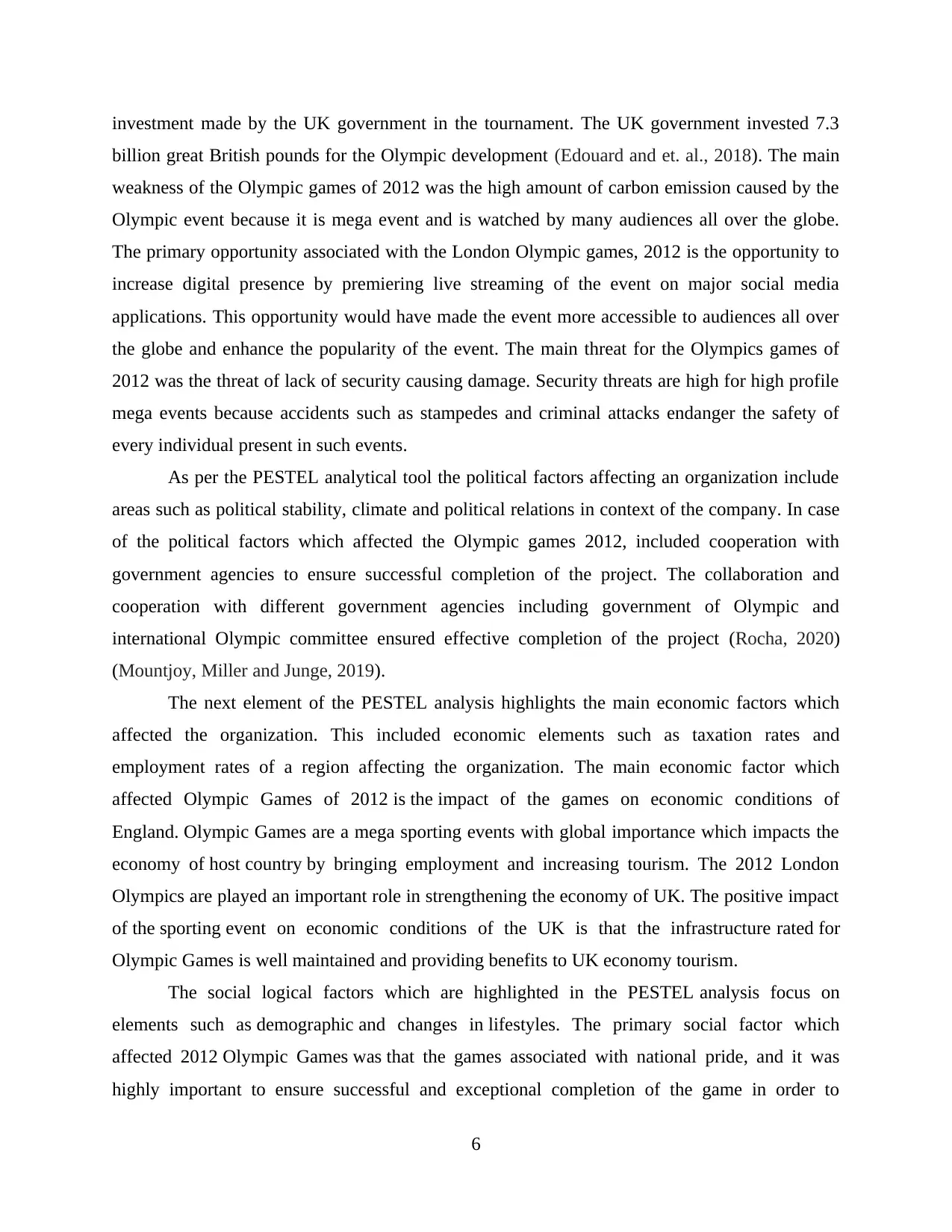
investment made by the UK government in the tournament. The UK government invested 7.3
billion great British pounds for the Olympic development (Edouard and et. al., 2018). The main
weakness of the Olympic games of 2012 was the high amount of carbon emission caused by the
Olympic event because it is mega event and is watched by many audiences all over the globe.
The primary opportunity associated with the London Olympic games, 2012 is the opportunity to
increase digital presence by premiering live streaming of the event on major social media
applications. This opportunity would have made the event more accessible to audiences all over
the globe and enhance the popularity of the event. The main threat for the Olympics games of
2012 was the threat of lack of security causing damage. Security threats are high for high profile
mega events because accidents such as stampedes and criminal attacks endanger the safety of
every individual present in such events.
As per the PESTEL analytical tool the political factors affecting an organization include
areas such as political stability, climate and political relations in context of the company. In case
of the political factors which affected the Olympic games 2012, included cooperation with
government agencies to ensure successful completion of the project. The collaboration and
cooperation with different government agencies including government of Olympic and
international Olympic committee ensured effective completion of the project (Rocha, 2020)
(Mountjoy, Miller and Junge, 2019).
The next element of the PESTEL analysis highlights the main economic factors which
affected the organization. This included economic elements such as taxation rates and
employment rates of a region affecting the organization. The main economic factor which
affected Olympic Games of 2012 is the impact of the games on economic conditions of
England. Olympic Games are a mega sporting events with global importance which impacts the
economy of host country by bringing employment and increasing tourism. The 2012 London
Olympics are played an important role in strengthening the economy of UK. The positive impact
of the sporting event on economic conditions of the UK is that the infrastructure rated for
Olympic Games is well maintained and providing benefits to UK economy tourism.
The social logical factors which are highlighted in the PESTEL analysis focus on
elements such as demographic and changes in lifestyles. The primary social factor which
affected 2012 Olympic Games was that the games associated with national pride, and it was
highly important to ensure successful and exceptional completion of the game in order to
6
billion great British pounds for the Olympic development (Edouard and et. al., 2018). The main
weakness of the Olympic games of 2012 was the high amount of carbon emission caused by the
Olympic event because it is mega event and is watched by many audiences all over the globe.
The primary opportunity associated with the London Olympic games, 2012 is the opportunity to
increase digital presence by premiering live streaming of the event on major social media
applications. This opportunity would have made the event more accessible to audiences all over
the globe and enhance the popularity of the event. The main threat for the Olympics games of
2012 was the threat of lack of security causing damage. Security threats are high for high profile
mega events because accidents such as stampedes and criminal attacks endanger the safety of
every individual present in such events.
As per the PESTEL analytical tool the political factors affecting an organization include
areas such as political stability, climate and political relations in context of the company. In case
of the political factors which affected the Olympic games 2012, included cooperation with
government agencies to ensure successful completion of the project. The collaboration and
cooperation with different government agencies including government of Olympic and
international Olympic committee ensured effective completion of the project (Rocha, 2020)
(Mountjoy, Miller and Junge, 2019).
The next element of the PESTEL analysis highlights the main economic factors which
affected the organization. This included economic elements such as taxation rates and
employment rates of a region affecting the organization. The main economic factor which
affected Olympic Games of 2012 is the impact of the games on economic conditions of
England. Olympic Games are a mega sporting events with global importance which impacts the
economy of host country by bringing employment and increasing tourism. The 2012 London
Olympics are played an important role in strengthening the economy of UK. The positive impact
of the sporting event on economic conditions of the UK is that the infrastructure rated for
Olympic Games is well maintained and providing benefits to UK economy tourism.
The social logical factors which are highlighted in the PESTEL analysis focus on
elements such as demographic and changes in lifestyles. The primary social factor which
affected 2012 Olympic Games was that the games associated with national pride, and it was
highly important to ensure successful and exceptional completion of the game in order to
6
⊘ This is a preview!⊘
Do you want full access?
Subscribe today to unlock all pages.

Trusted by 1+ million students worldwide
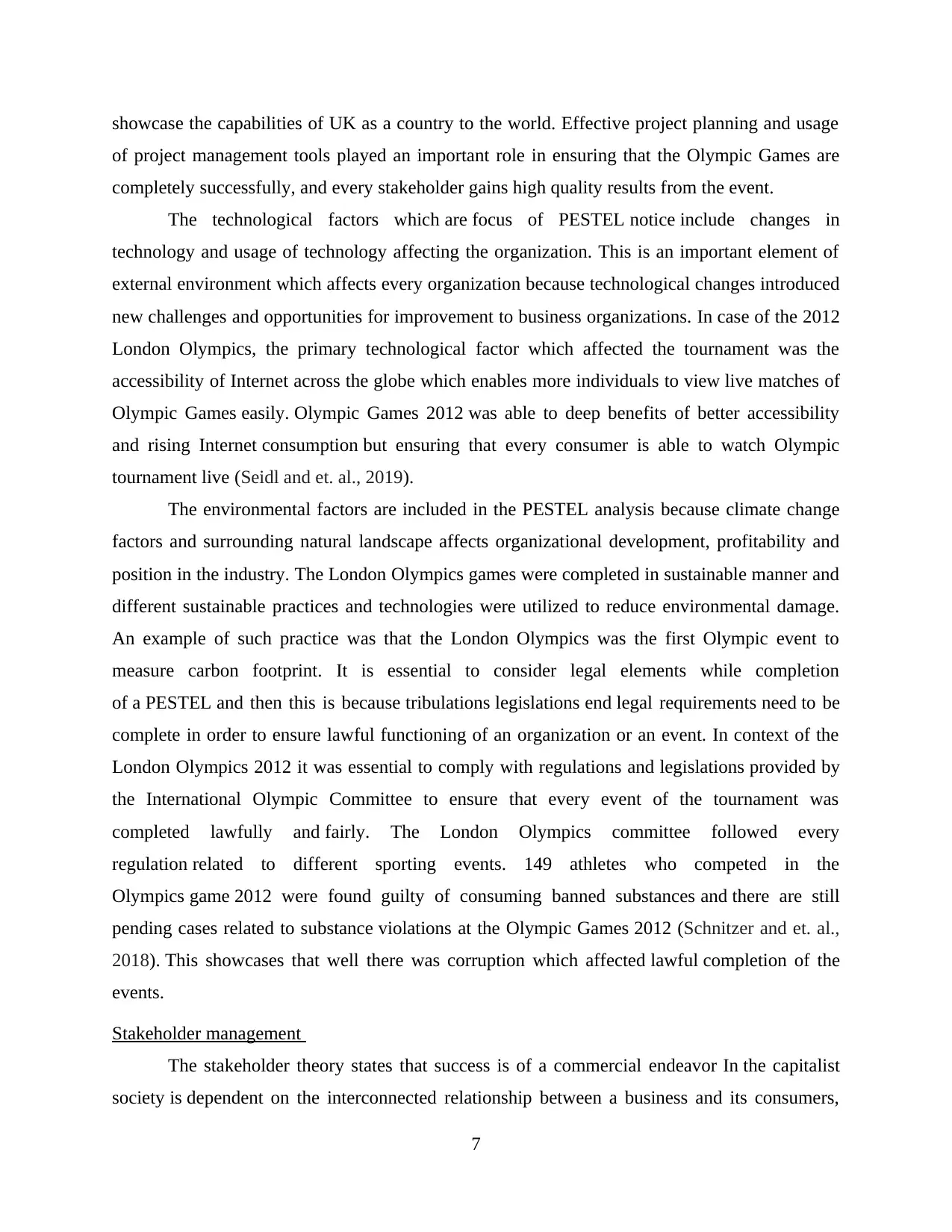
showcase the capabilities of UK as a country to the world. Effective project planning and usage
of project management tools played an important role in ensuring that the Olympic Games are
completely successfully, and every stakeholder gains high quality results from the event.
The technological factors which are focus of PESTEL notice include changes in
technology and usage of technology affecting the organization. This is an important element of
external environment which affects every organization because technological changes introduced
new challenges and opportunities for improvement to business organizations. In case of the 2012
London Olympics, the primary technological factor which affected the tournament was the
accessibility of Internet across the globe which enables more individuals to view live matches of
Olympic Games easily. Olympic Games 2012 was able to deep benefits of better accessibility
and rising Internet consumption but ensuring that every consumer is able to watch Olympic
tournament live (Seidl and et. al., 2019).
The environmental factors are included in the PESTEL analysis because climate change
factors and surrounding natural landscape affects organizational development, profitability and
position in the industry. The London Olympics games were completed in sustainable manner and
different sustainable practices and technologies were utilized to reduce environmental damage.
An example of such practice was that the London Olympics was the first Olympic event to
measure carbon footprint. It is essential to consider legal elements while completion
of a PESTEL and then this is because tribulations legislations end legal requirements need to be
complete in order to ensure lawful functioning of an organization or an event. In context of the
London Olympics 2012 it was essential to comply with regulations and legislations provided by
the International Olympic Committee to ensure that every event of the tournament was
completed lawfully and fairly. The London Olympics committee followed every
regulation related to different sporting events. 149 athletes who competed in the
Olympics game 2012 were found guilty of consuming banned substances and there are still
pending cases related to substance violations at the Olympic Games 2012 (Schnitzer and et. al.,
2018). This showcases that well there was corruption which affected lawful completion of the
events.
Stakeholder management
The stakeholder theory states that success is of a commercial endeavor In the capitalist
society is dependent on the interconnected relationship between a business and its consumers,
7
of project management tools played an important role in ensuring that the Olympic Games are
completely successfully, and every stakeholder gains high quality results from the event.
The technological factors which are focus of PESTEL notice include changes in
technology and usage of technology affecting the organization. This is an important element of
external environment which affects every organization because technological changes introduced
new challenges and opportunities for improvement to business organizations. In case of the 2012
London Olympics, the primary technological factor which affected the tournament was the
accessibility of Internet across the globe which enables more individuals to view live matches of
Olympic Games easily. Olympic Games 2012 was able to deep benefits of better accessibility
and rising Internet consumption but ensuring that every consumer is able to watch Olympic
tournament live (Seidl and et. al., 2019).
The environmental factors are included in the PESTEL analysis because climate change
factors and surrounding natural landscape affects organizational development, profitability and
position in the industry. The London Olympics games were completed in sustainable manner and
different sustainable practices and technologies were utilized to reduce environmental damage.
An example of such practice was that the London Olympics was the first Olympic event to
measure carbon footprint. It is essential to consider legal elements while completion
of a PESTEL and then this is because tribulations legislations end legal requirements need to be
complete in order to ensure lawful functioning of an organization or an event. In context of the
London Olympics 2012 it was essential to comply with regulations and legislations provided by
the International Olympic Committee to ensure that every event of the tournament was
completed lawfully and fairly. The London Olympics committee followed every
regulation related to different sporting events. 149 athletes who competed in the
Olympics game 2012 were found guilty of consuming banned substances and there are still
pending cases related to substance violations at the Olympic Games 2012 (Schnitzer and et. al.,
2018). This showcases that well there was corruption which affected lawful completion of the
events.
Stakeholder management
The stakeholder theory states that success is of a commercial endeavor In the capitalist
society is dependent on the interconnected relationship between a business and its consumers,
7
Paraphrase This Document
Need a fresh take? Get an instant paraphrase of this document with our AI Paraphraser
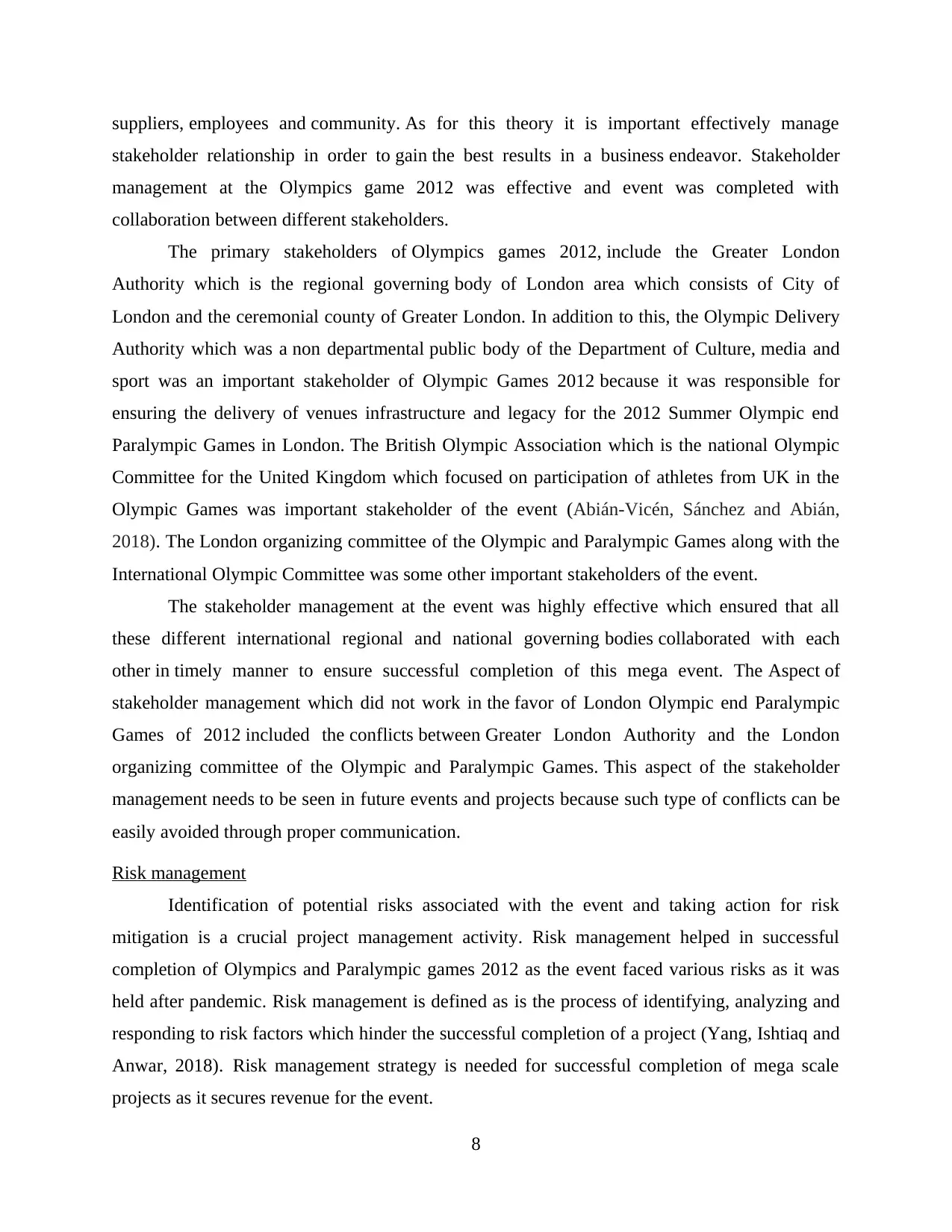
suppliers, employees and community. As for this theory it is important effectively manage
stakeholder relationship in order to gain the best results in a business endeavor. Stakeholder
management at the Olympics game 2012 was effective and event was completed with
collaboration between different stakeholders.
The primary stakeholders of Olympics games 2012, include the Greater London
Authority which is the regional governing body of London area which consists of City of
London and the ceremonial county of Greater London. In addition to this, the Olympic Delivery
Authority which was a non departmental public body of the Department of Culture, media and
sport was an important stakeholder of Olympic Games 2012 because it was responsible for
ensuring the delivery of venues infrastructure and legacy for the 2012 Summer Olympic end
Paralympic Games in London. The British Olympic Association which is the national Olympic
Committee for the United Kingdom which focused on participation of athletes from UK in the
Olympic Games was important stakeholder of the event (Abián-Vicén, Sánchez and Abián,
2018). The London organizing committee of the Olympic and Paralympic Games along with the
International Olympic Committee was some other important stakeholders of the event.
The stakeholder management at the event was highly effective which ensured that all
these different international regional and national governing bodies collaborated with each
other in timely manner to ensure successful completion of this mega event. The Aspect of
stakeholder management which did not work in the favor of London Olympic end Paralympic
Games of 2012 included the conflicts between Greater London Authority and the London
organizing committee of the Olympic and Paralympic Games. This aspect of the stakeholder
management needs to be seen in future events and projects because such type of conflicts can be
easily avoided through proper communication.
Risk management
Identification of potential risks associated with the event and taking action for risk
mitigation is a crucial project management activity. Risk management helped in successful
completion of Olympics and Paralympic games 2012 as the event faced various risks as it was
held after pandemic. Risk management is defined as is the process of identifying, analyzing and
responding to risk factors which hinder the successful completion of a project (Yang, Ishtiaq and
Anwar, 2018). Risk management strategy is needed for successful completion of mega scale
projects as it secures revenue for the event.
8
stakeholder relationship in order to gain the best results in a business endeavor. Stakeholder
management at the Olympics game 2012 was effective and event was completed with
collaboration between different stakeholders.
The primary stakeholders of Olympics games 2012, include the Greater London
Authority which is the regional governing body of London area which consists of City of
London and the ceremonial county of Greater London. In addition to this, the Olympic Delivery
Authority which was a non departmental public body of the Department of Culture, media and
sport was an important stakeholder of Olympic Games 2012 because it was responsible for
ensuring the delivery of venues infrastructure and legacy for the 2012 Summer Olympic end
Paralympic Games in London. The British Olympic Association which is the national Olympic
Committee for the United Kingdom which focused on participation of athletes from UK in the
Olympic Games was important stakeholder of the event (Abián-Vicén, Sánchez and Abián,
2018). The London organizing committee of the Olympic and Paralympic Games along with the
International Olympic Committee was some other important stakeholders of the event.
The stakeholder management at the event was highly effective which ensured that all
these different international regional and national governing bodies collaborated with each
other in timely manner to ensure successful completion of this mega event. The Aspect of
stakeholder management which did not work in the favor of London Olympic end Paralympic
Games of 2012 included the conflicts between Greater London Authority and the London
organizing committee of the Olympic and Paralympic Games. This aspect of the stakeholder
management needs to be seen in future events and projects because such type of conflicts can be
easily avoided through proper communication.
Risk management
Identification of potential risks associated with the event and taking action for risk
mitigation is a crucial project management activity. Risk management helped in successful
completion of Olympics and Paralympic games 2012 as the event faced various risks as it was
held after pandemic. Risk management is defined as is the process of identifying, analyzing and
responding to risk factors which hinder the successful completion of a project (Yang, Ishtiaq and
Anwar, 2018). Risk management strategy is needed for successful completion of mega scale
projects as it secures revenue for the event.
8
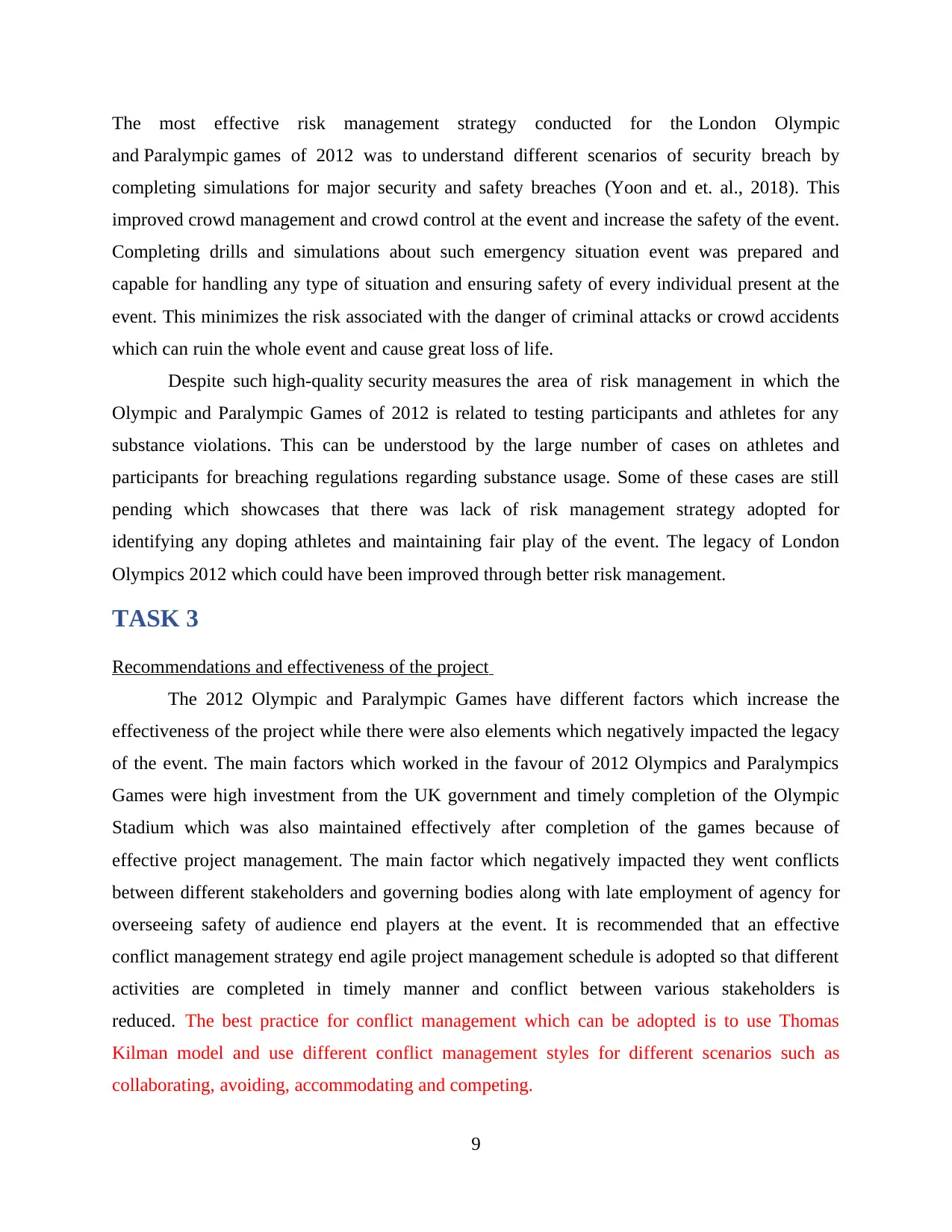
The most effective risk management strategy conducted for the London Olympic
and Paralympic games of 2012 was to understand different scenarios of security breach by
completing simulations for major security and safety breaches (Yoon and et. al., 2018). This
improved crowd management and crowd control at the event and increase the safety of the event.
Completing drills and simulations about such emergency situation event was prepared and
capable for handling any type of situation and ensuring safety of every individual present at the
event. This minimizes the risk associated with the danger of criminal attacks or crowd accidents
which can ruin the whole event and cause great loss of life.
Despite such high-quality security measures the area of risk management in which the
Olympic and Paralympic Games of 2012 is related to testing participants and athletes for any
substance violations. This can be understood by the large number of cases on athletes and
participants for breaching regulations regarding substance usage. Some of these cases are still
pending which showcases that there was lack of risk management strategy adopted for
identifying any doping athletes and maintaining fair play of the event. The legacy of London
Olympics 2012 which could have been improved through better risk management.
TASK 3
Recommendations and effectiveness of the project
The 2012 Olympic and Paralympic Games have different factors which increase the
effectiveness of the project while there were also elements which negatively impacted the legacy
of the event. The main factors which worked in the favour of 2012 Olympics and Paralympics
Games were high investment from the UK government and timely completion of the Olympic
Stadium which was also maintained effectively after completion of the games because of
effective project management. The main factor which negatively impacted they went conflicts
between different stakeholders and governing bodies along with late employment of agency for
overseeing safety of audience end players at the event. It is recommended that an effective
conflict management strategy end agile project management schedule is adopted so that different
activities are completed in timely manner and conflict between various stakeholders is
reduced. The best practice for conflict management which can be adopted is to use Thomas
Kilman model and use different conflict management styles for different scenarios such as
collaborating, avoiding, accommodating and competing.
9
and Paralympic games of 2012 was to understand different scenarios of security breach by
completing simulations for major security and safety breaches (Yoon and et. al., 2018). This
improved crowd management and crowd control at the event and increase the safety of the event.
Completing drills and simulations about such emergency situation event was prepared and
capable for handling any type of situation and ensuring safety of every individual present at the
event. This minimizes the risk associated with the danger of criminal attacks or crowd accidents
which can ruin the whole event and cause great loss of life.
Despite such high-quality security measures the area of risk management in which the
Olympic and Paralympic Games of 2012 is related to testing participants and athletes for any
substance violations. This can be understood by the large number of cases on athletes and
participants for breaching regulations regarding substance usage. Some of these cases are still
pending which showcases that there was lack of risk management strategy adopted for
identifying any doping athletes and maintaining fair play of the event. The legacy of London
Olympics 2012 which could have been improved through better risk management.
TASK 3
Recommendations and effectiveness of the project
The 2012 Olympic and Paralympic Games have different factors which increase the
effectiveness of the project while there were also elements which negatively impacted the legacy
of the event. The main factors which worked in the favour of 2012 Olympics and Paralympics
Games were high investment from the UK government and timely completion of the Olympic
Stadium which was also maintained effectively after completion of the games because of
effective project management. The main factor which negatively impacted they went conflicts
between different stakeholders and governing bodies along with late employment of agency for
overseeing safety of audience end players at the event. It is recommended that an effective
conflict management strategy end agile project management schedule is adopted so that different
activities are completed in timely manner and conflict between various stakeholders is
reduced. The best practice for conflict management which can be adopted is to use Thomas
Kilman model and use different conflict management styles for different scenarios such as
collaborating, avoiding, accommodating and competing.
9
⊘ This is a preview!⊘
Do you want full access?
Subscribe today to unlock all pages.

Trusted by 1+ million students worldwide
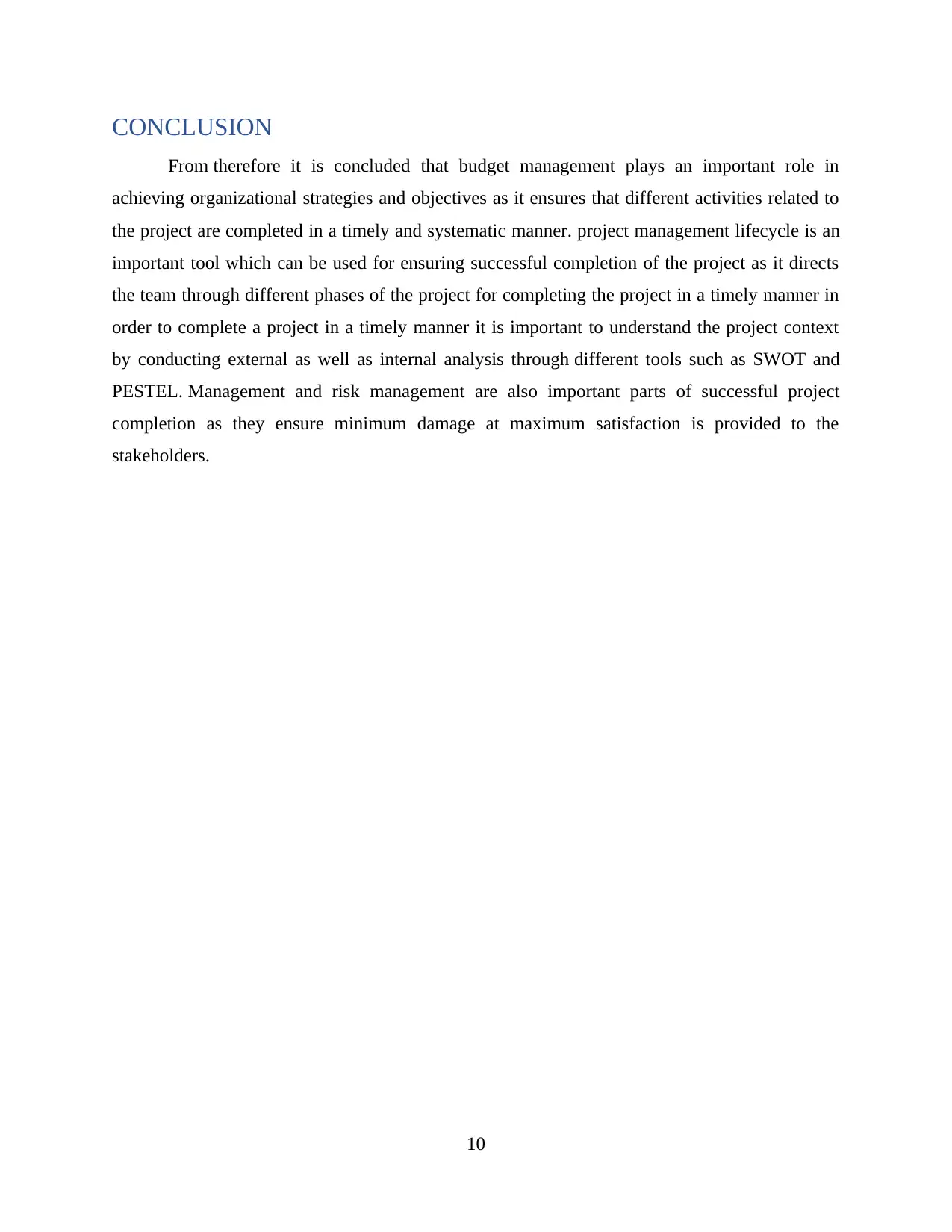
CONCLUSION
From therefore it is concluded that budget management plays an important role in
achieving organizational strategies and objectives as it ensures that different activities related to
the project are completed in a timely and systematic manner. project management lifecycle is an
important tool which can be used for ensuring successful completion of the project as it directs
the team through different phases of the project for completing the project in a timely manner in
order to complete a project in a timely manner it is important to understand the project context
by conducting external as well as internal analysis through different tools such as SWOT and
PESTEL. Management and risk management are also important parts of successful project
completion as they ensure minimum damage at maximum satisfaction is provided to the
stakeholders.
10
From therefore it is concluded that budget management plays an important role in
achieving organizational strategies and objectives as it ensures that different activities related to
the project are completed in a timely and systematic manner. project management lifecycle is an
important tool which can be used for ensuring successful completion of the project as it directs
the team through different phases of the project for completing the project in a timely manner in
order to complete a project in a timely manner it is important to understand the project context
by conducting external as well as internal analysis through different tools such as SWOT and
PESTEL. Management and risk management are also important parts of successful project
completion as they ensure minimum damage at maximum satisfaction is provided to the
stakeholders.
10
Paraphrase This Document
Need a fresh take? Get an instant paraphrase of this document with our AI Paraphraser
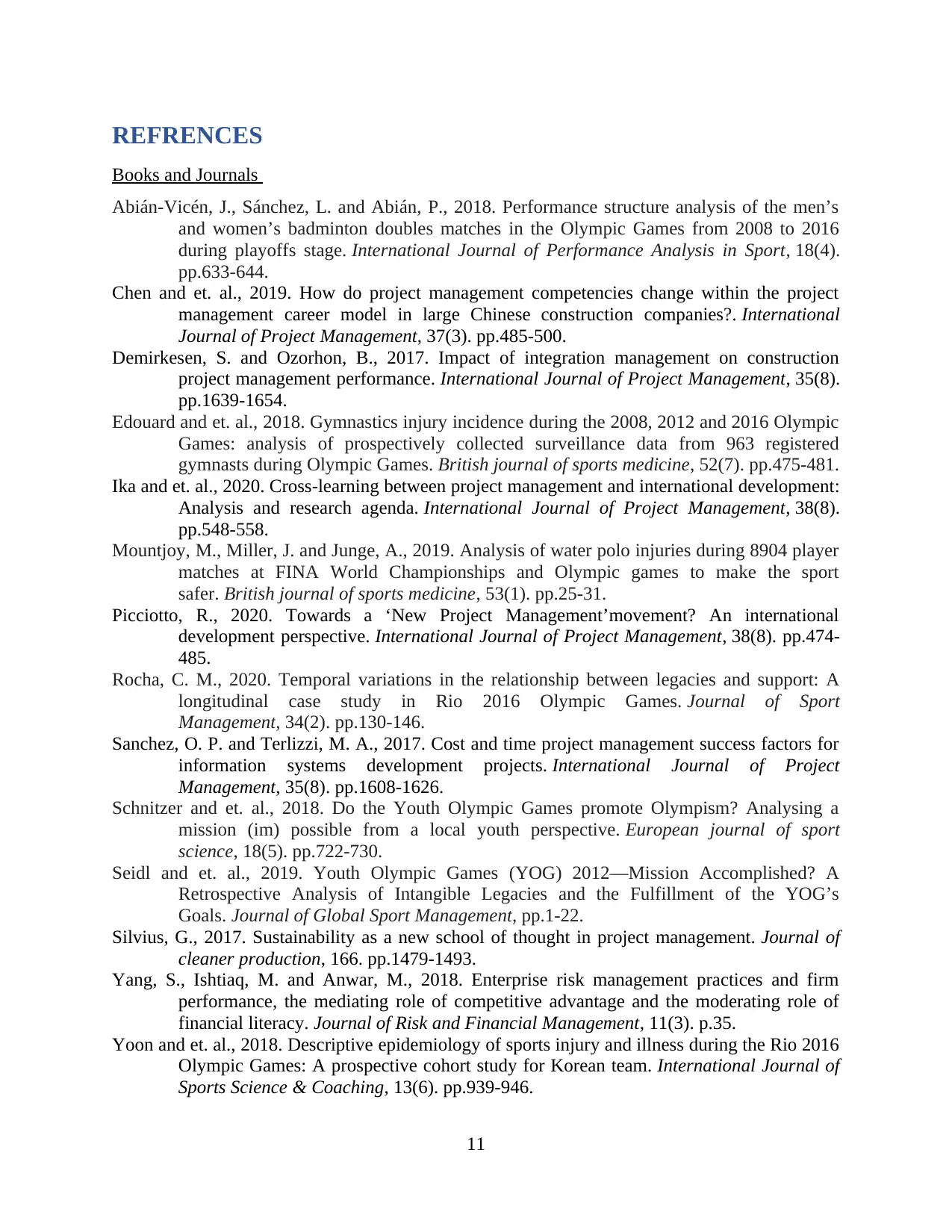
REFRENCES
Books and Journals
Abián-Vicén, J., Sánchez, L. and Abián, P., 2018. Performance structure analysis of the men’s
and women’s badminton doubles matches in the Olympic Games from 2008 to 2016
during playoffs stage. International Journal of Performance Analysis in Sport, 18(4).
pp.633-644.
Chen and et. al., 2019. How do project management competencies change within the project
management career model in large Chinese construction companies?. International
Journal of Project Management, 37(3). pp.485-500.
Demirkesen, S. and Ozorhon, B., 2017. Impact of integration management on construction
project management performance. International Journal of Project Management, 35(8).
pp.1639-1654.
Edouard and et. al., 2018. Gymnastics injury incidence during the 2008, 2012 and 2016 Olympic
Games: analysis of prospectively collected surveillance data from 963 registered
gymnasts during Olympic Games. British journal of sports medicine, 52(7). pp.475-481.
Ika and et. al., 2020. Cross-learning between project management and international development:
Analysis and research agenda. International Journal of Project Management, 38(8).
pp.548-558.
Mountjoy, M., Miller, J. and Junge, A., 2019. Analysis of water polo injuries during 8904 player
matches at FINA World Championships and Olympic games to make the sport
safer. British journal of sports medicine, 53(1). pp.25-31.
Picciotto, R., 2020. Towards a ‘New Project Management’movement? An international
development perspective. International Journal of Project Management, 38(8). pp.474-
485.
Rocha, C. M., 2020. Temporal variations in the relationship between legacies and support: A
longitudinal case study in Rio 2016 Olympic Games. Journal of Sport
Management, 34(2). pp.130-146.
Sanchez, O. P. and Terlizzi, M. A., 2017. Cost and time project management success factors for
information systems development projects. International Journal of Project
Management, 35(8). pp.1608-1626.
Schnitzer and et. al., 2018. Do the Youth Olympic Games promote Olympism? Analysing a
mission (im) possible from a local youth perspective. European journal of sport
science, 18(5). pp.722-730.
Seidl and et. al., 2019. Youth Olympic Games (YOG) 2012—Mission Accomplished? A
Retrospective Analysis of Intangible Legacies and the Fulfillment of the YOG’s
Goals. Journal of Global Sport Management, pp.1-22.
Silvius, G., 2017. Sustainability as a new school of thought in project management. Journal of
cleaner production, 166. pp.1479-1493.
Yang, S., Ishtiaq, M. and Anwar, M., 2018. Enterprise risk management practices and firm
performance, the mediating role of competitive advantage and the moderating role of
financial literacy. Journal of Risk and Financial Management, 11(3). p.35.
Yoon and et. al., 2018. Descriptive epidemiology of sports injury and illness during the Rio 2016
Olympic Games: A prospective cohort study for Korean team. International Journal of
Sports Science & Coaching, 13(6). pp.939-946.
11
Books and Journals
Abián-Vicén, J., Sánchez, L. and Abián, P., 2018. Performance structure analysis of the men’s
and women’s badminton doubles matches in the Olympic Games from 2008 to 2016
during playoffs stage. International Journal of Performance Analysis in Sport, 18(4).
pp.633-644.
Chen and et. al., 2019. How do project management competencies change within the project
management career model in large Chinese construction companies?. International
Journal of Project Management, 37(3). pp.485-500.
Demirkesen, S. and Ozorhon, B., 2017. Impact of integration management on construction
project management performance. International Journal of Project Management, 35(8).
pp.1639-1654.
Edouard and et. al., 2018. Gymnastics injury incidence during the 2008, 2012 and 2016 Olympic
Games: analysis of prospectively collected surveillance data from 963 registered
gymnasts during Olympic Games. British journal of sports medicine, 52(7). pp.475-481.
Ika and et. al., 2020. Cross-learning between project management and international development:
Analysis and research agenda. International Journal of Project Management, 38(8).
pp.548-558.
Mountjoy, M., Miller, J. and Junge, A., 2019. Analysis of water polo injuries during 8904 player
matches at FINA World Championships and Olympic games to make the sport
safer. British journal of sports medicine, 53(1). pp.25-31.
Picciotto, R., 2020. Towards a ‘New Project Management’movement? An international
development perspective. International Journal of Project Management, 38(8). pp.474-
485.
Rocha, C. M., 2020. Temporal variations in the relationship between legacies and support: A
longitudinal case study in Rio 2016 Olympic Games. Journal of Sport
Management, 34(2). pp.130-146.
Sanchez, O. P. and Terlizzi, M. A., 2017. Cost and time project management success factors for
information systems development projects. International Journal of Project
Management, 35(8). pp.1608-1626.
Schnitzer and et. al., 2018. Do the Youth Olympic Games promote Olympism? Analysing a
mission (im) possible from a local youth perspective. European journal of sport
science, 18(5). pp.722-730.
Seidl and et. al., 2019. Youth Olympic Games (YOG) 2012—Mission Accomplished? A
Retrospective Analysis of Intangible Legacies and the Fulfillment of the YOG’s
Goals. Journal of Global Sport Management, pp.1-22.
Silvius, G., 2017. Sustainability as a new school of thought in project management. Journal of
cleaner production, 166. pp.1479-1493.
Yang, S., Ishtiaq, M. and Anwar, M., 2018. Enterprise risk management practices and firm
performance, the mediating role of competitive advantage and the moderating role of
financial literacy. Journal of Risk and Financial Management, 11(3). p.35.
Yoon and et. al., 2018. Descriptive epidemiology of sports injury and illness during the Rio 2016
Olympic Games: A prospective cohort study for Korean team. International Journal of
Sports Science & Coaching, 13(6). pp.939-946.
11
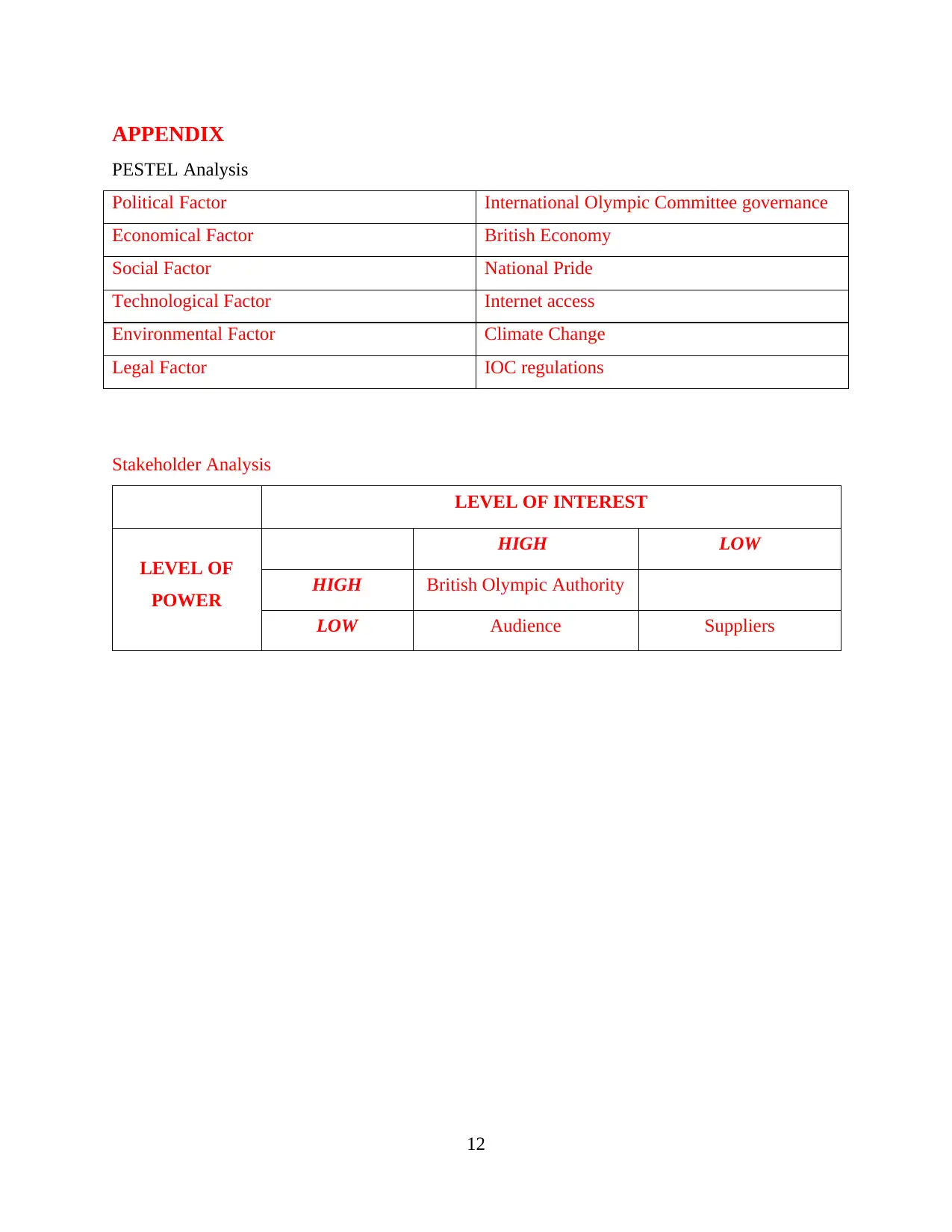
APPENDIX
PESTEL Analysis
Political Factor International Olympic Committee governance
Economical Factor British Economy
Social Factor National Pride
Technological Factor Internet access
Environmental Factor Climate Change
Legal Factor IOC regulations
Stakeholder Analysis
LEVEL OF INTEREST
LEVEL OF
POWER
HIGH LOW
HIGH British Olympic Authority
LOW Audience Suppliers
12
PESTEL Analysis
Political Factor International Olympic Committee governance
Economical Factor British Economy
Social Factor National Pride
Technological Factor Internet access
Environmental Factor Climate Change
Legal Factor IOC regulations
Stakeholder Analysis
LEVEL OF INTEREST
LEVEL OF
POWER
HIGH LOW
HIGH British Olympic Authority
LOW Audience Suppliers
12
⊘ This is a preview!⊘
Do you want full access?
Subscribe today to unlock all pages.

Trusted by 1+ million students worldwide
1 out of 12
Related Documents
Your All-in-One AI-Powered Toolkit for Academic Success.
+13062052269
info@desklib.com
Available 24*7 on WhatsApp / Email
![[object Object]](/_next/static/media/star-bottom.7253800d.svg)
Unlock your academic potential
Copyright © 2020–2026 A2Z Services. All Rights Reserved. Developed and managed by ZUCOL.





